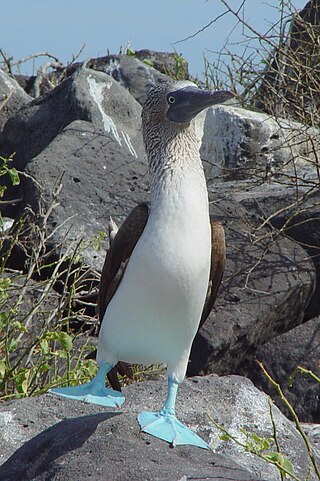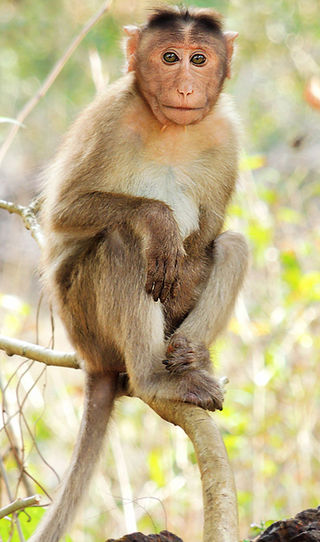
Mackerel is a common name applied to a number of different species of pelagic fish, mostly from the family Scombridae. They are found in both temperate and tropical seas, mostly living along the coast or offshore in the oceanic environment.

Herring are various species of forage fish, mostly belonging to the family of Clupeidae.

The International Union for Conservation of Nature (IUCN) Red List of Threatened Species, also known as the IUCN Red List or Red Data Book, founded in 1964, is an inventory of the global conservation status and extinction risk of biological species. A series of Regional Red Lists, which assess the risk of extinction to species within a political management unit, are also produced by countries and organizations.

A booby is a seabird in the genus Sula, part of the family Sulidae. Boobies are closely related to the gannets (Morus), which were formerly included in Sula.

The macaques constitute a genus (Macaca) of gregarious Old World monkeys of the subfamily Cercopithecinae. The 23 species of macaques inhabit ranges throughout Asia, North Africa, and Europe. Macaques are principally frugivorous, although their diet also includes seeds, leaves, flowers, and tree bark. Some species such as the long-tailed macaque will supplement their diets with small amounts of meat from shellfish, insects, and small mammals. On average, a southern pig-tailed macaque in Malaysia eats about 70 large rats each year. All macaque social groups are arranged around dominant matriarchs.

Presbytis is a genus of Old World monkeys also known as langurs, leaf monkeys, or surilis. Members of the genus live in the Thai-Malay Peninsula, on Sumatra, Borneo, Java and smaller nearby islands.

A genet is a member of the genus Genetta, which consists of 17 species of small African carnivorans. The common genet is the only genet present in Europe and occurs in the Iberian Peninsula, Italy and France.
This article is a list of biological species, subspecies, and evolutionary significant units that are known to have become extinct during the Holocene, the current geologic epoch, ordered by their known or approximate date of disappearance from oldest to most recent.

Platymiscium is a genus of flowering plants in the family Fabaceae, and was recently assigned to the informal monophyletic Pterocarpus clade within the Dalbergieae. It has a Neotropical distribution, from northern Mexico to southern Brazil. Platymiscium is the only genus in the family with opposite leaves in all its species. Its wood has various uses, mostly for constructions and furniture. It's wood is also sometimes referred to as Granadillo, Macacauba, Macawood, Hormigo, or Orange Agate.

Platymiscium gracile is a species of plant in the family Fabaceae. It is found only in Peru.
Platymiscium parviflorum, synonym Platymiscium pleiostachyum, is a species of plant in the family Fabaceae. It is found in Central America: Costa Rica, El Salvador, Guatemala, Honduras and Nicaragua. It is threatened by habitat loss.

Genettinae is a subfamily of the feliform viverrids. It contains all of the genet species and the oyan species.










